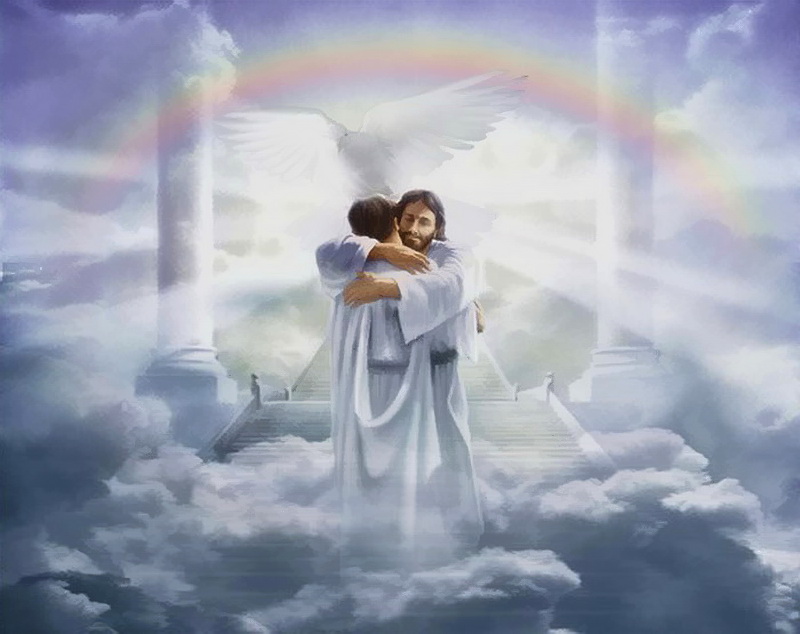THEME: THE KINGDOM OF HEAVEN
READINGS: Wisdom 12:13, 16-19 /Romans 8:26-27 /Matthew 13:24-43
16th Sunday in Ordinary Time
Beloved, what will be your answer to the question: ‘Why are you in the church today?’ You may probably answer: ‘I am here to worship my Lord and my God’. If you are here to worship God, let me ask you a further question: Why do you make time to worship God every Sunday? You may say: ‘To thank and praise God for what He has been doing for me.’
Is that all? You may add: ‘To thank and praise Jesus for dying for me.’ Why did He die for you? You may say: ‘To save me from my sins.’ Is that all? Did He save you so that you remain on this earth forever? ‘No’, you may say, ‘He saved me so that I will be with God forever in heaven – to enjoy in the kingdom of heaven.’ Exactly! We are here today and every Sunday or anytime we gather because of our hope to enter the kingdom of heaven. The kingdom of heaven is the ultimate, that’s why Jesus says: ‘Seek ye first the kingdom of heaven …’ (Matt. 6:33).
The expression, ‘kingdom of heaven’ appears three times in today’s gospel reading (Matt. 13:24-43). In fact the ‘kingdom of heaven’ is the key message of the preaching of Jesus Christ. He began His ministry with the message, ‘repent, the kingdom of heaven is at hand’ (Matt. 4:17). The importance of the kingdom of heaven in Jesus’ preaching could be seen from the frequency with which the term ‘kingdom’ appears in the gospels. It appears 56 times in Matthew’s Gospel alone and 127 times in all the four gospels together.
Whereas, it may be very easy to describe an earthly kingdom (e.g. Ashanti kingdom, United Kingdom), it is difficulty to describe the heavenly kingdom. In the first case, one can easily talk about: who the king or queen is; how he or she was chosen; the geographical area or size of the kingdom; its population; etc. It may be very easy to describe an earthly kingdom, because it is a physical reality. On the other hand, the kingdom of heaven is not a physical reality. It is a spiritual reality; it is a mystery; we cannot see everything about it whilst on this earth. Therefore, to explain the mystery of the kingdom of heaven, Jesus chooses to use parables. That is, He uses things we know (wheat, weeds, seeds and yeast) to explain what we do not know.
TWO ASPECTS OF THE KINGDOM
Let us now look at two aspects of the kingdom of heaven from the parables of today’s gospel reading: recruitment into the kingdom and its small beginning.
Recruitment Exercise: to tell us about the recruitment exercise, Jesus uses the parable of the wheat and weeds. Through this parable, Jesus is telling us that to enter heaven is not by chance. Gaining access to heaven is unlike the case of some Africans obtaining US visa via lottery. Rather, it is God who selects; it is He who will at the end of time distinguish the wheats from the weeds. May God select us for His kingdom – Amen!
Furthermore, evil or sin (represented by the weeds) cannot enter God’s kingdom. That is why Jesus says from the onset of His ministry: ‘Repent, for the kingdom of heaven is at hand.’ Now, since with God nothing is impossible and nothing is too late, may God turn the weeds in us into wheats ripe for his kingdom, Amen!
Small beginning: to tell us that the recruitment exercise starts with a few but the end result will be an uncountable number of people in heaven, Jesus narrates the parable of the mustard seed. May there be room in heaven for each of us! Amen! For our parents and siblings, amen! For our (deceased) grandparents, amen! For all our friends, amen! For all our parishioners, amen! And for your children’s’ children, amen!
The third parable (in today’s gospel reading) of yeast in some dough of flour, like that of the mustard seed, is about the ever-increasing number of people entering God’s kingdom. Again, let our daily prayer be that ‘when the saints go marching in …O Lord, I want to be in their number.’
CONCLUSION
Finally, let me end with an insight inspired during a conversation with a friend. He lives and works in UK with a work permit but he says that he does not want to acquire a dual-citizenship because he aspires to be an MP in Ghana. (Ghana’s 1992 Constitution does not allow Ghanaians with dual citizenship to become MPs.) Similarly, this earth is not our permanent home. We have only work permit. Let us not lead our lives as if we will live here forever! Let us aspire to be MPs (Members of Paradise) of heaven where we are already citizens (Phil. 3:20-21). Amen!
By Very Rev. Fr. John Louis
